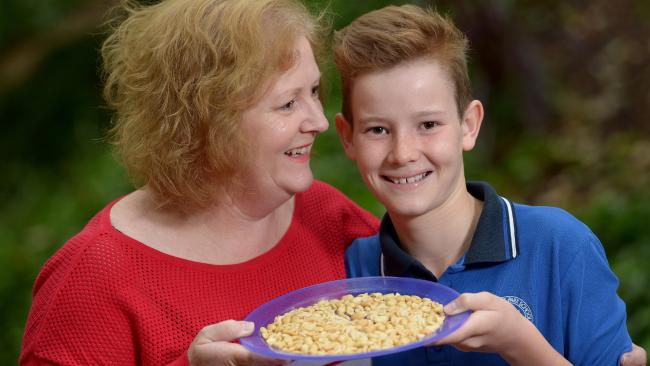
CHILDREN who were so allergic to peanuts they needed emergency adrenaline injections are now happily munching nuts daily as a result of a world-first medical trial in Adelaide.
The Flinders Medical Centre project by paediatric allergist Dr Billy Tao uses a two-step technique, initially boiling peanuts for two hours to make them less allergenic.
Children are fed these peanuts to partially desensitise them, then when they show no signs of allergic reaction, the children are fed roasted peanuts to further increase their tolerance.
Of 14 participants aged under 16 who all had serious allergic reactions, 10 have completed the first stage and are now eating roasted peanuts daily, while four continue to eat boiled peanuts daily. The ethically approved trial has not been attempted anywhere else.
“One patient who had to be administered three adrenaline injections after consuming peanuts is now eating roasted peanuts every day without problems,” Dr Tao said.
His idea was based on German researcher Professor Kirsten Beyer’s observation that peanut allergies are less prevalent in China than the western world, and Chinese children tend to eat boiled peanuts rather than roasted.
Dr Tao was on the verge of retirement but instead decided to pursue this project, remembering that babies in his native China are fed peanuts boiled for so long they become soft, before progressing to roasted nuts when older.
Dr Tao’s partnership with Dr Tim Chataway, Head of the Flinders Proteomics Facility and Professor Kevin Forsyth from the FMC Paediatrics Department proved peanuts boiled for at least two hours are much less allergenic.
He cautioned against families trying the method at home and stressed children with a nut allergy should see an allergist.
The team is planning a project where peanuts are boiled for 12 hours to treat the most severe cases of allergic reaction.
“Desensitisation is temporary — if the patient stops eating peanuts the protective effect will gradually wear off,” Dr Tao said.
“However, if the patient continues to eat peanuts regularly, they may reach the status of oral tolerance and be considered as cured. This is the holy grail of allergy treatment.”
About three per cent of Australian children have a peanut allergy.
Kirstin White, of Cumberland Park, has constantly worried about son Rory, 12, having contact with peanuts after he was diagnosed as a baby and he has carried an EpiPen adrenaline needle as a precaution.
“It is quite terrifying — you worry there will be some minor contact causing a reaction, and now he is almost a teenager there is a bit of stigma about it, worrying about going on excursions and to parties,” Mrs White said.
“He now eats a handful of roasted peanuts a night and has a letter from Dr Tao that he no longer needs the EpiPen — we are thrilled.”